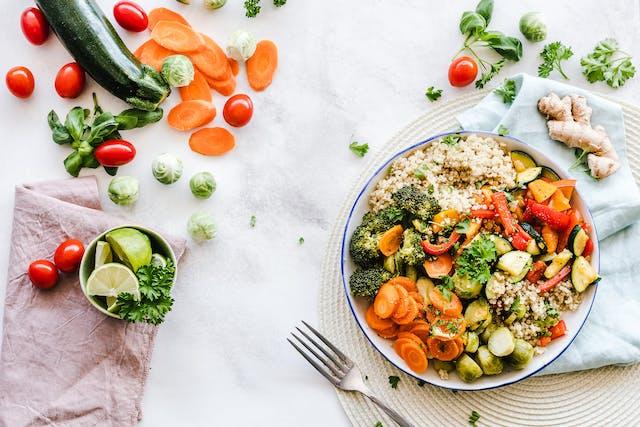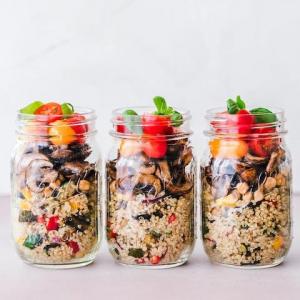
Time and Convenience:
One of the primary benefits of meal prepping is the time and convenience it offers. By dedicating a few hours on a designated day to prepare your meals, you can save significant time during the week. Instead of spending time each day deciding what to cook, shopping for ingredients, and cooking from scratch, you can simply grab a pre-prepared meal and heat it up. This is especially beneficial for busy individuals or those with hectic schedules who struggle to find time to cook nutritious meals regularly.Plan your meals for the week: Take some time at the beginning of each week to plan your meals. Consider your schedule, dietary preferences, and nutritional needs. Create a meal plan that includes a variety of dishes to avoid monotony and ensure a balanced diet.
Make a grocery list: Once you have your meal plan, create a detailed grocery list. This will help you stay organized and ensure you have all the necessary ingredients on hand. Stick to your list to avoid impulse buys and save time at the store.
Batch cooking: Choose a day or two each week to dedicate to cooking in larger quantities. Prepare multiple servings of dishes that can be easily stored and reheated later. This reduces overall cooking time and ensures you have meals ready to go throughout the week. Utilize kitchen appliances: Invest in kitchen appliances like a slow cooker, Instant Pot, or rice cooker, which can make meal prep more efficient. These appliances allow you to cook large batches of food with minimal effort and supervision, freeing up your time for other tasks.
Health and Nutrition:
Meal prepping can significantly contribute to healthier eating habits. When you have pre-prepared meals available, you are less likely to rely on convenience foods or opt for unhealthy takeout. By planning and preparing your meals in advance, you have control over the ingredients and portion sizes, allowing you to make healthier choices. Additionally, meal prepping can help you stick to specific dietary goals, such as weight loss, muscle gain, or managing certain health conditions.Focus on whole foods: Incorporate a variety of whole foods into your meal plan, including lean proteins, whole grains, fruits, vegetables, and healthy fats. These foods provide essential nutrients and support overall health.
Mindful portion control: Pay attention to portion sizes when prepping your meals. Use measuring cups or a food scale to ensure you are consuming appropriate quantities. This can help with weight management and prevent overeating.
Experiment with new recipes: Meal prepping doesn't have to be boring. Explore new recipes and flavors to keep your meals exciting and enjoyable. Try incorporating different herbs, spices, and cooking techniques to enhance the taste of your dishes.
Balance macronutrients: Ensure your meals contain a balance of protein, carbohydrates, and fats. This combination will help keep you satisfied, provide sustained energy, and support muscle recovery and overall health.
Cost Savings:
Meal prepping can also lead to significant cost savings. By planning your meals in advance and buying ingredients in bulk, you can take advantage of sales and discounts. Additionally, cooking at home is generally more cost-effective compared to eating out or relying on convenience foods. By preparing meals in bulk, you can reduce food waste and stretch your budget further.Shop sales and discounts: Check weekly grocery store flyers or websites for sales and discounts on ingredients you frequently use. Plan your meals based on these discounted items to save money.
Buy in bulk: Consider purchasing staple items, such as grains, legumes, and spices, in bulk. This is often more cost-effective and reduces packaging waste.
Use leftovers creatively: Don't waste leftovers; repurpose them into new meals. For example, use leftover grilled chicken to make a salad or wrap, or incorporate roasted vegetables into a frittata or grain bowl.
Grow your own herbs and vegetables: If you have space and time, consider growing your own herbs and vegetables. This can save money and provide you with fresh, homegrown produce.
Variety and Customization:
Contrary to the misconception that meal prepping leads to monotonous meals, it can actually provide a wide range of food choices and customization options. By planning your meals in advance, you can incorporate a variety of flavors, textures, and cuisines into your weekly menu. Additionally, meal prepping allows you to customize meals based on dietary restrictions or preferences, ensuring that you are eating food that suits your needs.Experiment with different cuisines: Incorporate a variety of cuisines into your meal plan to keep things interesting. Try Asian, Mediterranean, Mexican, or Indian-inspired dishes to add diverse flavors and textures to your meals.
Mix and match ingredients: Prepare individual components of your meals separately, such as proteins, grains, and vegetables. This allows you to mix and match different ingredients throughout the week, creating new combinations and flavors.
Use different cooking methods: Rotate between cooking methods like grilling, baking, sautéing, or steaming to add variety to your meals. Each cooking method brings out different flavors and textures in ingredients.
Incorporate seasonal produce: Take advantage of seasonal fruits and vegetables to add freshness and variety to your meals. Seasonal produce is often more flavorful and cost-effective.
Customize to dietary needs: Adjust your meal plan to accommodate any dietary restrictions or preferences you may have, such as vegetarian, vegan, gluten-free, or dairy-free. This ensures that you are eating food that aligns with your needs and preferences.
Meal prepping offers numerous benefits, including time and convenience, improved health and nutrition, cost savings, and a wide variety of food choices and customization options. By implementing efficient and healthy meal planning techniques, such as creating a meal plan, making a grocery list, batch cooking, and utilizing kitchen appliances, you can make the most of your meal prepping efforts. Remember to prioritize whole foods, practice mindful portion control, experiment with new recipes, and balance macronutrients to ensure a nutritious and well-rounded meal plan. With proper planning and organization, meal prepping can become a sustainable and enjoyable habit that supports your overall well-being.
Article
Be the first comment
69,429 Views
0
0














